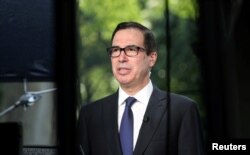The International Atomic Energy Agency said Thursday Iran is complying with restrictions on its nuclear program in accord with the 2015 international agreement. The inspectors' assessment is the first since U.S. President Donald Trump withdrew the United States from the pact.
The United Nations atomic watchdog said Tehran is staying within limits on the level to which it can enrich uranium, the size of its stock of enriched uranium and other strictures. But it chided Iran for limiting "complementary access" inspections.
The U.N. assessment came as the U.S. imposed new sanctions on Iran in an effort to force the Islamic Republic back to the bargaining table to negotiate new terms of the nuclear agreement, curb its ballistic missile tests, end its military advances in the Middle East.
The U.S. says in coming months, it will reimpose sanctions it and other countries dropped when Tehran agreed to restrain its nuclear program — measures that hobbled the Iranian economy. But the five other signatories to the Iran nuclear accord — Britain, France, Germany, China and Russia — all have said they continue to support the deal.
Thursday's sanctions targeted nine individuals and companies for providing support to Iranian airlines that previously had been blacklisted.
The U.S. Treasury Department said Tehran-based Mahan Air was cited for playing a "critical role in exporting the Iranian regime's malign influence," saying it has "routinely" flown fighters and supplies to Syria in support of Syrian President Bashar al-Assad.
In a statement, Treasury Secretary Steven Mnuchin said, "Countries and companies around the world should take note of the risks associated with granting landing rights and providing aviation services to the airlines used by Iran to export terrorism throughout the region."
"The deceptive practices these airlines employ to illegally obtain services and U.S. goods is yet another example of the duplicitous ways in which the Iranian regime has operated," Mnuchin said.
The U.S. sanctions also targeted three other Iranian carriers, Caspian Air, Meraj Air, and Pouya Air, as well as Turkish nationals and entities for assisting the Iranian airlines.
The sanctions are aimed at preventing Iran from buying U.S.-export controlled components to sustain their air fleets.





